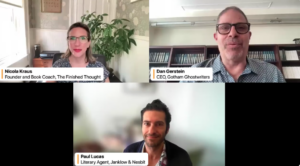 Probably the biggest mistake an aspiring author can make is assuming that their only job is to write a good book. That’s only step one. Then you have to market it. Marketing and publicity have always been integral to a book’s success, but, increasingly, publishers are depending on authors to do most of the grunt work. “Well, that’s annoying!” you’re probably thinking. I agree. It sucks. It would be great if writers could just write and have their work recognized on its own. But that’s not how the world works, and if you want to be successful as an author, you need to understand this reality.
Probably the biggest mistake an aspiring author can make is assuming that their only job is to write a good book. That’s only step one. Then you have to market it. Marketing and publicity have always been integral to a book’s success, but, increasingly, publishers are depending on authors to do most of the grunt work. “Well, that’s annoying!” you’re probably thinking. I agree. It sucks. It would be great if writers could just write and have their work recognized on its own. But that’s not how the world works, and if you want to be successful as an author, you need to understand this reality.
There are several reasons why authors are being tasked with more promotional responsibility, and, despite popular opinion, it’s not because publishers are lazy and are trying to foist their responsibilities onto their authors so they can kick up their heels and drink martinis all day. It’s because their efforts are becoming less and less effective and authors have become the best promoters for their books.
In the past few decades, several shifts have occurred that have made it more difficult for publishers to get attention for their books. There are fewer book review sections in newspapers and fewer bookstores in which readers can peruse and discover new books. Plus, there is increasing competition from outside the book industry to reach audiences. Up until relatively recently, books (and newspapers and magazines) were the only portable form of entertainment, but now that you can watch TV, listen to music, play games, check email, call your mom, shop for shoes–ALL THE THINGS–anywhere you go, books, which require effort and concentration, have a tough time competing. At the same time, audiences have become fragmented, with people seeking news, information, and entertainment from places designed specifically for their needs and interests. You don’t need the New York Times to tell you which books are worth reading. You can find out from your favorite blog or on social media. It’s a paradox really: there are more places to promote books than ever before, but their reach is relatively small and specific compared to the major media outlets of yore. Thus, the formula for a successful promotional campaign has become more complicated.
Publishers–even the major ones–no longer have the power they once had to “make” a bestseller because audiences aren’t listening to them nearly as much as they once did. Yes, they still have a lot of clout and resources, and the editor of the New York Times Book Review is still going to take their calls (or respond to their emails), but even a few major publicity hits is not enough to guarantee readers are paying attention. When it comes to first-time authors especially, publishers are tasked with creating an audience out of people who have plenty of other things they can choose to spend their time and money on. And that’s really friggin’ hard.
Enter the marketing section. The goal of this part of the book proposal is to convince the publisher that your book can be promoted in a way that will encourage people to buy it. All too often, authors neglect this section thinking it secondary to conveying what the book is about. But because publishers struggle to promote all of their books (not just yours, remember), they are looking for authors who can help them out and who understand that a successful marketing campaign is more sophisticated than simply “pitch the book to national media.” Authors who understand how promotion works and are capable of doing some of the legwork on their own have a huge advantage over those who don’t. There are two reasons for this: 1) publishers can use all the help they can get in publicizing books, and 2) readers trust authors more than publishers.
The internet and social media have made it possible for audiences to interact directly with the creators of the content they consume, and so they no longer need a gatekeeper to help them gain access. They don’t need NPR or the New York Times to tell them when their favorite writer has a new book out; they follow that writer on social media or join their mailing list so they get updates directly.
Of course there are exceptions to every rule, but, generally speaking, the more direct a connection you have to your target audience, the more likely your book will sell. And the more likely your book will sell, the more likely a publisher will want to publish it. Conveying this is the point of the marketing section.
The biggest mistake authors make with the marketing section is to list a bunch of generic venues in which their book could potentially be marketed: NPR, the Today Show, the New York Times, etc. etc. It is quite possible any of these places would promote your book, but it’s also possible that they’d promote literally any other book, and pointing this out fails to distinguish your book in any useful way. The publisher doesn’t need to be told to pitch your book to NPR. They know.
The other problem with doing this is that these places are extremely competitive, and they typically only cover certain types of books. For example, if you’re writing a book about how to organize your closets, then the Today Show may very well be interested in having you on because they could create a fun interactive segment around it that their audience will love. But if you’re writing a memoir about your life-changing trip to Transylvania, well, then, the Today Show is not the right platform. It’s great to aim high, but being strategic with your marketing section indicates that you understand the market for a book like yours and have given thought to how it might be received. Publishers want to work with savvy authors.
Don’t be afraid of the niche market. Your potential reader is already seeking out information about their interests from places that cater to those particular interests, so meet them where they are. What blogs cover the subject you’re writing about? What venues host events with authors like you? What podcasts have done segments on subjects similar to yours? The Today Show might not be interested in your Transylvania memoir, but a podcast that focuses on European travel or a blog dedicated to travel memoirs certainly might. And the people who listen to that podcast or read that blog have, by virtue of seeking out this content, expressed interest in your book before they even know it exists. The publisher may or may not know these places, but by proving that you do, you’re demonstrating you know what your readers want.
Like I said, publishers are relying on you to do most of the work to promote your book, so it’s still not enough to give them a list of helpful suggestions. They’ll happily send a galley and a pitch letter to that European travel podcast, but what if Stephen, the creator of that podcast, is getting galleys of every European travel memoir out there and can only have one guest on his weekly show? Who is he going to choose? He may indeed choose you. Perhaps he’s really interested in Dracula and has never interviewed anyone about Romania on his show before, so the opportunity excites him and will be fun for his audience. But neither you nor the publisher can control for this outcome.
There is a way to increase your chances instead of relying on blind luck: know Stephen. If you get a Facebook party invite from someone you don’t know, you will not be attending their DJ set at the hot new night club downtown, even if they happen to be the best DJ on the planet. But if your best friend, DJ Kelv$n, invites you, you will definitely be down to go watch him spin some sick tracks on Saturday night because you know him, want to support him, regardless of how much you like (or dislike) his work. The same is true of book publishing and pretty much every marketing endeavor on the planet: people prioritize people they know. Period. This goes for Stephen and the people who listen to Stephen’s podcast, too. If he knows you and likes you, Stephen would probably love to help you promote your book. And Stephen’s listener will be more apt to buy your book if Stephen recommends it on his podcast because he trusts Stephen’s opinion.
I’m not suggesting you call up every podcast host and try to be their buddy (though it definitely doesn’t hurt to network with people who are interested in your subject area). I’m making the point that you want to emphasize your strongest connections when putting together your marketing plan. Do you know someone who works at the New York Times and is in a position to cover your book? Great, mention that. Have you been a guest on Stephen’s European Travels podcast before and think it likely he’d have you on again? Perfect. Write that down. Is your best friend the editor of that travel memoir blog? Nice! Your connections need not be the biggest wigs at the most famous publications; they must simply be real (none of this “my-ex-boyfriends-mom-once-met-Katie-Couric-at-a-cocktail-party” crap) and relevant (that’s cool that your brother-in-law is a producer at ESPN, but he’s not going to feature your Transylvania memoir on Sports Center).
What’s even better than knowing people who can market your book? Being able to market your book yourself. This is the holy grail every publisher is looking for: an author with a built-in platform and audience who can promote his or her book directly to interested readers. An author who runs a popular travel blog will have a better chance of getting her travel memoir published than one who doesn’t (especially given that memoirs are notoriously difficult to publish). By way of example, in the past few years, some of the most popular cookbooks on the market have not been by Food Network stars but by bloggers who gained a dedicated following on their own by posting recipes and cooking tips on their websites. It’s quite possible you’ve never heard of Angela Liddon or Dana Shultz or their vegan cooking sites Oh She Glows or The Minimalist Baker, respectively, but both women have published bestselling cookbooks whose sales were driven primarily through direct promotion on their websites and within the vegan cooking community of which they were already a part.
Your following doesn’t have to be a blog. It could be a podcast or YouTube channel, or perhaps you contribute regularly to another platform (like a website or magazine) that is already established. It could also be a robust speaking schedule or email newsletter (both of which are highly popular among business authors). It just has to be a venue through which you can communicate directly with your target audience–whomever they are.
A word on social media: while social media is an important marketing tool, having a lot of followers is not enough. It’s much more important that your audience is engaged rather than large, so if you have 100,000 Twitter followers, but no one likes or re-tweets your posts, then those followers are not going to buy your book. Similarly, if you have 20,000 Instagram followers, and your posts average 15,000 likes, then that’s a sign you have a highly engaged audience and will cause a publisher to take notice. That being said, social media has proved to be a finicky sales tool (perhaps because users browse through dozens of posts at a time and therefore have divided attention spans), so a robust social media presence may not suffice in enticing a publisher. If you’ve been thinking of hiring someone to boost your followers, save your money. Publishers can tell when your audience has not been grown organically.
Contrary to popular belief, publishing people love numbers. How much traffic does your blog get each month? How many people subscribe to your newsletter? How many people attend the events at which you’ve been invited to speak? What’s the readership of the website you contribute to? Obviously, the larger these numbers are, the better.
I suspect a good portion of you are reading this and thinking “Well, crap. I don’t have any of that!” If this is the case, you might still be able to find a publisher depending on how unique your subject matter is and/or if you have a certain expertise that is rare. For example, if you are a professor of European history at an Ivy League school and are the world’s foremost expert on Vlad the Impaler, a publisher can use that credential as a hook to attract publicity for your Transylvania memoir. Or if you’ve won a prestigious award in your field and are writing a book about that field, this will indicate to publishers that you have respect among your colleagues, who are all potential readers. If there is interest in the subject matter and no one is better suited than you to write the book, then an audience will exist that the publisher can target.
If you lack this type of credential, then it is going to be very difficult for you to land a publishing deal with a traditional house. If you’re not interested in self-publishing, then my biggest piece of advice is to spend some time building your platform so you can flesh out your marketing plan before writing a proposal. Some authors get grandiose ideas about how they’ll build their platform after they get a book deal, and spend most of the marketing section in their proposal detailing all of these ideas. (“I plan to start a promotional hashtag campaign on Instagram!” “I will reach out to other famous authors to see if they’ll mention my book on their website!” “I will hire a professional web designer to help me start a website and blog!”) But publishers are interested in concrete things that either have happened or are likely to happen in the near future. How do they know your Instagram campaign will be a success if you’ve never run one before? I realize you want to appear energetic and eager, but so does every author. Focus on being realistic and specific so the publisher can tell you know what’s up.
The way you go about building your platform is up to you. My advice is to go about it in a way that feels natural. If you hate Twitter, don’t force yourself to use it. If the idea of blogging several times a week gives you agita, start a podcast or YouTube channel or pitch an idea to an established site. If you’re writing fiction, submit short stories to literary journals. There are countless ways to get your idea out there. It requires effort, and nothing is guaranteed, but if you want to be a published author, the investment will be worth it.
In summary: when putting together the marketing and publicity section of your proposal, do your homework so you can be as specific as possible and emphasize all the ways you can connect directly with your reader. If you do so effectively, you’ll convince the publisher that you’re worth taking a chance on, and will be well on your way to a great book deal.
___________
* This article originally appeared on brookecarey.com.
Author
-
Brooke Carey is a freelance writer, editor, and book collaborator with more than 9 years of industry experience. She launched her freelance editorial business in May 2016.
View all posts



